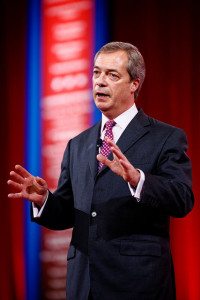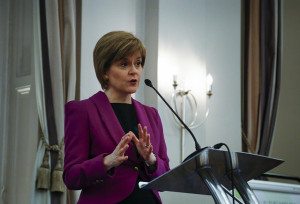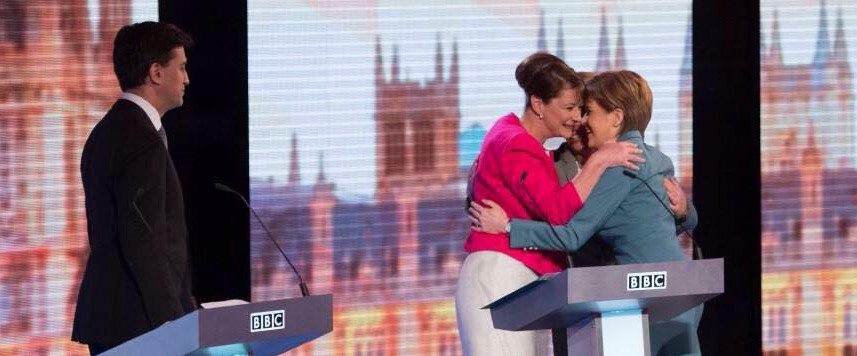Recap: The BBC Election Debate 2015
[dropcap]W[/dropcap]ith less than three weeks to go until Election Day, the five-way BBC Election Debate 2015 with David Dimbleby at the helm was always going to be a heated affair. David Cameron and Nick Clegg were missing, the women outnumbered the men, and Nigel Farage was present. Certainly an interesting mix of ingredients which delivered an exciting and thought-provoking discussion, filled with some fantastic one-liners and strong audience reactions.
We were treated first to opening remarks from the five leaders who were present: Leanne Wood (Plaid Cymru), Nigel Farage (UKIP), Ed Miliband (Labour), Nicola Sturgeon (SNP) and Natalie Bennet (Green). Following a similar structure to the BBC debate a few weeks previously, the opening remarks were one minute each, and focused on on why each party will be best choice on the ballot slip this May.
Relatively run-of-the-mill, this was the predictable one minute “why you should pick me” part of the night
Well-spoken and well-rehearsed, it was unsurprising to hear what they had to say, though I did think Leanne Wood said cats (she in fact said cuts, much more relevant) were a choice, which, though true, was surprisingly unfitting.
The questions then came from four members of the audience and covered debt, the housing crisis, Trident, and immigration. Not having known the topics for discussion beforehand, each party leader answered the question in one minute, followed by a ten minute debate. The one minute answers were reminiscent of the opening remarks, but the debate between leaders was much more engaging through some polemics aimed at party leaders who were and weren’t there (cough cough, where were you, David Cameron?).

Photo: Flickr / Michael Vadon
On the plans around government spending and the debt, Miliband was quick to counter Farage’s claim that UKIP was the only party with a credible plan by asserting that UKIP’s figures didn’t add up. This was denied by Farage, who asked if Miliband had even read their manifesto. Nicola Sturgeon then seemed to express what many were thinking when she stated that the difference between Cameron and Miliband simply wasn’t big enough, because Labour’s alternative to austerity is “pretend”.
It was the issue of housing, though, which led to the first big, real uproar (literally), as Farage criticised the composition of the audience, leading to some strong boos. Though I’m not a politician, surely the idea is to get people on your side and voting for you? Criticising the audience then, can’t be a good idea no matter what. That should be put on the lesson plan of Debating 101. Dimbleby proved himself much more effective than ITV’s Julie Etchingham as he scolded Farage and moved the debate along.

Photo: Flickr / First Minister of Scotland
Amidst this, Farage also talked about the housing crisis and UKIP’s policies on immigration. This lead to some groans; Sturgeon accused Farage of blaming all problems on immigration. Whether this is true or not, the audience’s positive reaction to Sturgeon’s attack suggests that this was also how they perceived Farage.
Next came the contentious issue of nuclear weapons, which led to some more head to heads between Farage and Miliband. This turned from heated debate to more raucous shouting, not dissimilar to the House of Commons, when immigration was revealed as the last topic of discussion. With some strong statistics from Bennett and Sturgeon which supported their arguments that it is important not to scapegoat immigrants, Farage and Miliband were trading arguments on NHS funding which escalated into Natalie Bennet shouting over them in an attempt to be heard. The one liner of the night came in the form of “I think Natalie wanted to say something”from Ed Miliband, after he’d been asked to respond by the all-powerful Dimbleby.
One thing that was agreed on by all, though that sounds a ludicrous impossibility, was that David Cameron should have been present to defend his record
With Nicola Sturgeon calling it a disgrace, she also made it clear that she is hoping for support from Labour – as she said to Miliband, the SNP can help to make Labour’s policies bolder, and together they need to lock the Tories out of Downing Street. Miliband refused though, because, he said, he had “fundamental disagreements”with her.
This wasn’t Miliband’s strongest moment of the night, however. This came as the debate was ending, and he spoke directly to Cameron: “If you believe this election is about leadership then debate me one-on-one.”Certainly one way to issue a challenge, it left everyone thinking about Cameron again, although sorely emphasised the fact that the Liberal Democrats had barely had a mention. With many on Twitter referring to it as an invitation that was appropriate for WrestleMania, its effectiveness hasn’t been quite what the Labour leader was hoping for, since Cameron doesn’t seem to have responded. Ironically, Nick Clegg offered to debate him through the medium of Twitter: “Any time, any place, anywhere.”Anywhere? Does this mean WrestleMania is still an option?

Comments